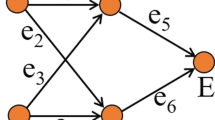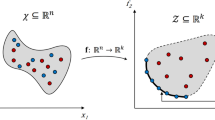Abstract
In the first part of this paper we will give a short historical survey of the field of hybrid systems, a precise definition of a hybrid system and some comments on the definition. In a second paper (“Hybrid systems and hybrid computation – 2nd part: Hybrid computation”) we will concentrate on a particular aspect of the theory closely related to scientific computation, that we have called hybrid computation.
Similar content being viewed by others
References
R. Alur and D.L. Dill, A theory of timed automata, Theoret. Comput. Sci. 126 (1994) 183–235.
R. Alur, T.A. Henzinger and P.H. Ho, Hybrid automata: An algorithmic approach to the specification and verification of hybrid systems, in: Hybrid Systems, Lecture Notes in Computer Science, Vol. 736 (Springer, New York, 1993) pp. 209–229.
R. Alur, T.A. Henzinger and E.D. Sontag, eds., Hybrid Systems III, Lecture Notes in Computer Science, Vol. 1066 (Springer, New York, 1996).
P. Antsaklis, W. Kohn, M. Lemmon, A. Nerode and S. Sastry, eds., Hybrid Systems V, Lecture Notes in Computer Science, Vol. 1567 (Springer, New York, 1999).
P. Antsaklis, W. Kohn, A. Nerode and S. Sastry, eds., Hybrid Systems II, Lecture Notes in Computer Science, Vol. 999 (Springer, New York, 1995).
P. Antsaklis, W. Kohn, A. Nerode and S. Sastry, eds., Hybrid Systems IV, Lecture Notes in Computer Science, Vol. 1273 (Springer, New York, 1997).
V. Arnold, Chapitres Supplémentaires de la Théorie des Équations Différentielles Ordinaires (Mir, Moscou, 1984), chapters 1, 4.
J.P. Aubin, Viability Theory (Birkhäuser, Boston, 1991).
J.P. Aubin and A. Cellina, Differential Inclusions. Set-Valued Maps and Viability Theory, Grundlehren der Mathematischen Wissenschaften, Vol. 264 (Springer, New York, 1984).
J.P. Aubin and H. Frankowska, Set-Valued Analysis (Birkhäuser, Boston, 1990).
M.S. Branicky, Studies in Hybrid Systems: Modeling, Analysis and Control, Ph.D. thesis (MIT Press, Cambridge, MA, 1995).
R.L. Grossman, A. Nerode, A.P. Ravn and H. Rischel, eds., Hybrid Systems I, Lecture Notes in Computer Science, Vol. 736 (Springer, New York, 1993).
E. Hubert, Etude algébrique et algorithmique des singularités des équations différentielles implicites, Ph.D. thesis, Institut National Polytechnique Grenoble (1997).
K.H. Johansson, M. Egerstedt, J. Lygeros and S. Sastry, On the regularization of zeno hybrid automata, Systems Control Lett. 38 (1999) 141–150.
I. Kaplansky, An Introduction to Differential Algebra, 2nd ed. (Hermann, Paris, 1996).
X. Nicolin, A. Olivero and S. Yovine, An approach to the description and analysis of hybrid automata, in: Hybrid Systems I, Lecture Notes in Computer Science, Vol. 736 (Springer, New York, 1993) pp. 149–178.
J.W. Polderman and J.C. Willems, Introduction to Mathematical Systems Theory: A Behavioral Approach, Texts in Applied Mathematics, Vol. 26 (Springer, New York, 1998).
E. Sontag, Mathematical Control Theory. Deterministic Finite-Dimensional Systems, 2nd ed., Texts in Applied Mathematics, Vol. 6 (Springer, New York, 1998).
L. Tavernini, Differential automata and their discrete simulators, Nonlinear Anal. Theory Methods Appl. 11(6) (1987) 665–683.
G. Thomas, Contributions théoriques et algorithmiques à l'étude des équations différentiellesalgébriques. Approche par le calcul formel, Ph.D. thesis, Institut National Polytechnique Grenoble (1997).
H.S. Witsenhausen, A class of hybrid-state continuous-time dynamic systems, IEEE Trans. Automat. Control 11(2) (1966) 161–167.
Author information
Authors and Affiliations
Rights and permissions
About this article
Cite this article
Della Dora, J., Mirica-Ruse, M. & Tournier, E. Hybrid Systems and Hybrid Computation 1st Part: Hybrid Systems. Numerical Algorithms 33, 203–213 (2003). https://doi.org/10.1023/A:1025564005405
Issue Date:
DOI: https://doi.org/10.1023/A:1025564005405




